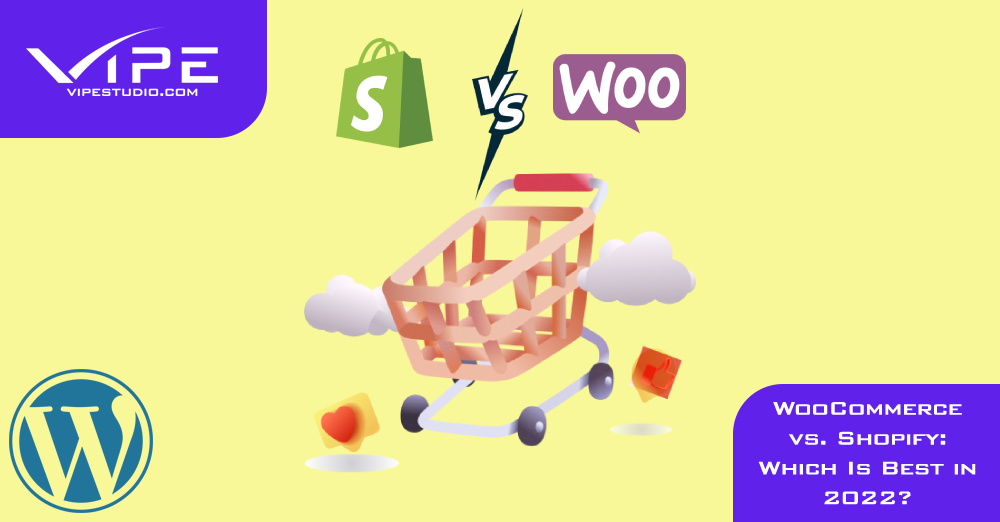27.08.2022
WordPress Development
WooCommerce vs. Shopify: Which Is Best in 2022?
READING TIME: MIN
Table of Content
Do you intend to open an online store? Not sure if WooCommerce or Shopify is best for you? The two leading eCommerce systems in the world are Shopify and WooCommerce, each of which has its advantages and disadvantages.
Your success as a business owner depends on selecting the ideal eCommerce platform for your needs. That is why our WordPress development agency will provide you with a thorough comparison of Shopify and WooCommerce in this article. The objective is to contrast their benefits and drawbacks to assist you in selecting the ideal solution for your eCommerce company.
What is Shopify?
With Shopify, you can easily build an online store, collect payments, and manage your inventory from a single platform. With Shopify, you can manage an eCommerce site without worrying about technical issues, such as web hosting, security, caching, etc.

Shopify Pros and Cons
Before choosing the platform for your company, you should weigh the benefits and drawbacks of Shopify. Here are some of them in further detail!
Shopify Advantages
- Multi-channel integration
- Easier to use
- Faster to build
- Superior security
- Presents an endless variety of things
- Recovery of a forgotten cart
- More than a hundred different payment choices
- The presence of discount codes
- Full support for websites and blogs
- Improved customer service in general
- Faster performance and loading times
- Increased price transparency
Shopify Disadvantages
- Limited flexibility and customization
- Often more expensive

What is WooCommerce?
WooCommerce is a WordPress plugin for open-source eCommerce. It enables you to utilize the most robust content management system (CMS) to administer an online business. 43 percent of all websites are powered by WordPress, the most widely used website builder on the globe. WooCommerce, however, is the most widely used eCommerce platform. It, such as WordPress, is open-source, allowing you complete customization of your business and the simple addition of unique plugins. Your needs and degree of competence are the only factors that should be considered while deciding between the two platforms.
WooCommerce Pros and Cons
Like every top CMS platform for eCommerce, WooCommerce offers its own set of benefits and drawbacks. Look at some of them now in more detail!
WooCommerce Advantages
- Stylish themes
- Mobile responsive
- Built-in blogging option
- Large degree of flexibility and customization
- Simple refund method
- Ability to include items
- Recovery of a forgotten cart
- There are several plugins and functionality offered.
- With no transaction costs
- Free to use and more reasonably priced overall

WooCommerce Disadvantages
- Users should take care of hosting, installations, and updates
- 24/7 Support only for premium extensions
Which is Better?
There isn’t really a simple answer given their diversity and distinct pros and downsides. Both Shopify and WooCommerce have their own unique advantages and disadvantages and were created with very diverse users in mind, making them superior in certain circumstances. For you, Shopify could be a better choice if:
- There isn’t a webpage for you already.
- You must swiftly and effectively launch an internet store.
- You wish to open your business with a simple setup process.
- You need 24/7 Support.
However, WooCommerce may be your best option if:
- You currently run a WordPress website.
- You desire more authority over your online shop.
- You want to be able to swiftly make significant modifications to your website.
- You don’t need much help from the platform’s customer service to operate.

Choose what makes sense for you between WooCommerce and Shopify
Our WordPress development agency advises you to select the one that will work best for you and your business first and foremost when deciding between WooCommerce and Shopify. WooCommerce is certainly a better choice if you currently have a WordPress website and want an eCommerce store that is adaptable and simple to adjust. Shopify is perhaps a better option if you’re trying to completely construct an online store.
More on The Topic
- Challenging Conventional Wisdom in WordPress Scalability
- Understanding Client Needs: The Art of WordPress Discovery
- Leveraging WordPress REST API: Transforming Data Handling
- Navigating WooCommerce Performance: Real-World Strategies
- The Role of AI in WordPress Development Workflows
Tags: ecommerceonline shoponline storeShopifywoocommerce
The content of this website is copyrighted and protected by Creative Commons 4.0.



